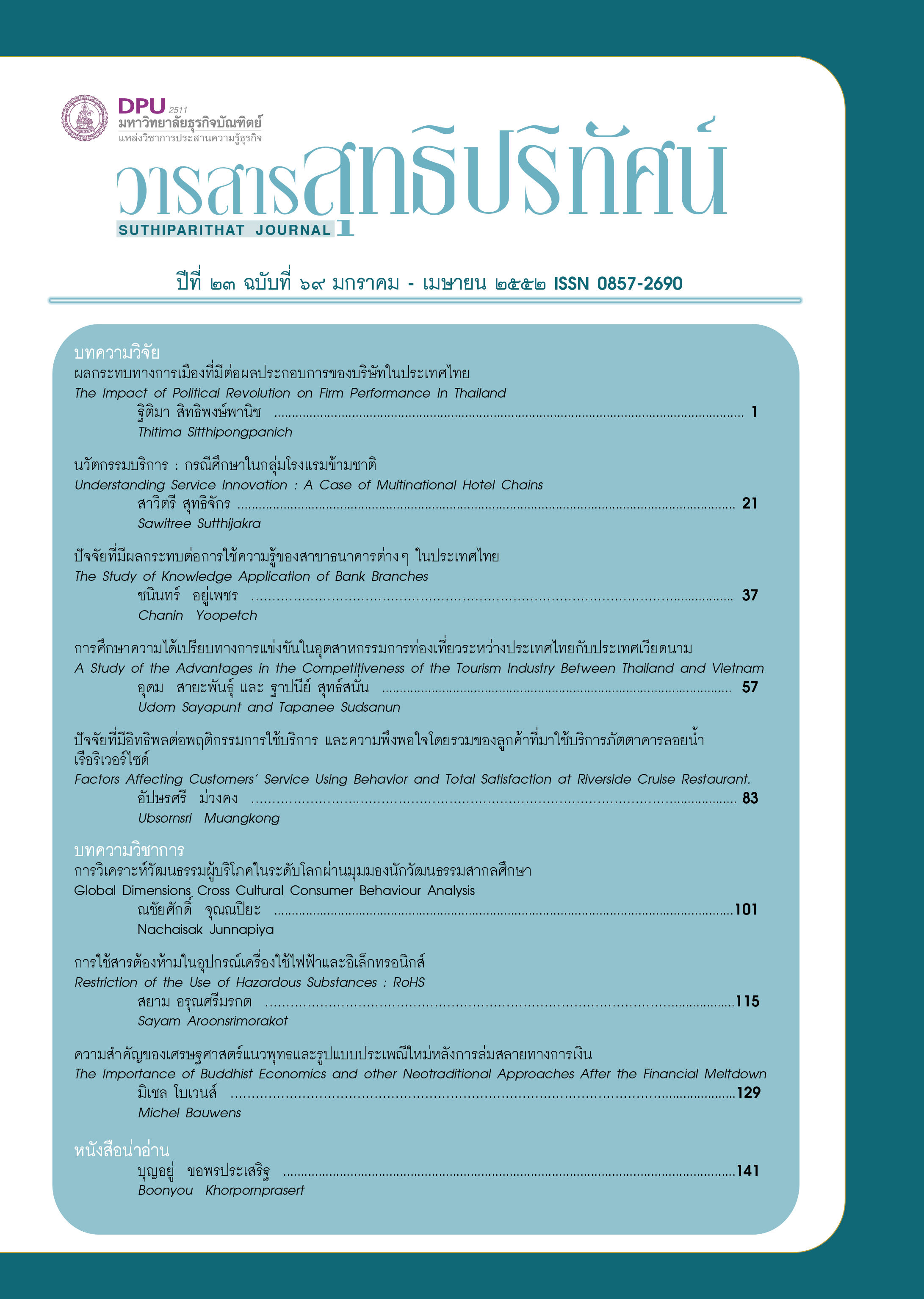นวัตกรรมบริการ : กรณีศึกษาในกลุ่มโรงแรมข้ามชาติ
คำสำคัญ:
นวัตกรรมบริการ, โรงแรมข้ามชาติบทคัดย่อ
งานวิจัยนี้มุ่งสร้างตัวแบบในการอธิบายนวัตกรรมบริการในโรงแรมข้ามชาติขนาดใหญ่ 3 แห่ง โดยมุ่งศึกษาลักษณะเฉพาะของนวัตกรรมบริการและแหล่งที่มาของนวัตกรรมบริการในกลุ่มโรงแรมทั้ง 3 แห่ง งานวิจัยนี้เป็นงานวิจัยเชิงคุณภาพโดยใช้วิธีวิการวิจัยแบบ กรณีศึกษาในการศึกษานวัตกรรมบริการในกลุ่มโรงแรม โดยกลุ่มโรงแรมทั้ง 3 กลุ่ม ประกอบด้วย กลุ่มโรงแรมอินเตอร์คอนติเนนทอล กลุ่มโรงแรมแมริออตต์และกลุ่มโรงแรมแอคคอร์ นักวิจัยเก็บข้อมูลโดยการสัมภาษณ์ผู้บริหารและผู้บริหารระดับสูงในกลุ่มโรงแรม ทั้ง 3 กลุ่ม ใน 4 ประเทศได้แก่ ประเทศอังกฤษ ประเทศไทย ประเทศฝรั่งเศสและฮ่องกง ผลการวิจัยระบุว่านวัตกรรมบริการในกลุ่มโรงแรมในกรณีศึกษาเป็นการเปลี่ยนแปลงในบริการและกระบวนการบริการอย่างเล็กน้อยค่อยเป็นค่อยไป และเป็นระบบนวัตกรรม บริการในโรงแรมถูกกระตุ้นด้วยความต้องการของลูกค้า นวัตกรรมบริการในกลุ่มโรงแรมนี้ ประกอบไปด้วยนวัตกรรมทางเทคโนโลยี และนวัตกรรมที่ไม่ใช่เทคโนโลยี แหล่งที่มาของนวัตกรรมบริการในกลุ่มโรงแรมนี้ได้แก่ ลูกค้า พนักงานในโรงแรมและสำนักงานใหญ่ อย่างไรก็ตามสำนักงานใหญ่และผู้จัดการของโรงแรมในเครือจะเป็นผู้ตัดสินใจขั้นสุดท้ายในการเลือกนวัตกรรมที่เหมาะสมสำหรับโรงแรม
เอกสารอ้างอิง
Boden, M. & Miles, I. (2000) Chapter 14 Conclusions: Beyond the Services Economy. IN Boden, M. & Miles, I. (Eds.) Services and the Knowledge-Based Economy. New York, Continuum.
Coombs, R., Saviotti, P. & Walsh, V. (1987) Economics and Technological Change, Hong Kong, Macmillan Education.
Czepiel, J. (1990) Service Encounters and Service Relationship. Journal of Business Research, 20, 13-21.
Donthu, N. & Yoo, B. (1 9 9 8 ) Cultural Influences on Service Quality Expectations. Journal of Service Research, 1, 178-186.
Flynn, F. J. & Chatman, J. A. (2004) Strong Cultures and Innovation: Oxymoron or Opportunity? IN Tushman, M. L. & Anderson, P. (Eds.) Managing Strategic Innovation and Change. 2 ed. Oxford, Oxford University Press.
Francis, D. & Bessant, J. (2004) Targeting Innovation and Implications for Capability Development. Technovation, In press, Corrcted Proof,, 1-13.
Freeman, C. & Soete, L. (1997) The Economics of Industrial Innovation, UK, Thomson.
Gallouj, F. (2002) Innovation in the Service Economy: the New Wealth of Nations, Cheltenham, UK, Edward Elgar.
Green, L., Howells, J. & Miles, I. (2001) Services and Innovation: Dynamics of Service Innovation in the European Union. Report for ECOFIN meetings of European Union Finance Ministers. PREST and CRIC, University of Manchester.
Johnston, R. & Clark, G. (2001) Service Operations Management, London, Prentice Hall.
Kanter, R. (1990) How to Compete. Harvard Business Review, 68, 7-9.
Knowles, T. (1996) Corporate Strategy For Hospitality, Essex, Longman.
Kotabe, M. & Helsen, K. (2001) Global Marketing Management, New York, John Wiley & Sons.
Lam, A. (2006) Organizational Innovation. IN Fagerberg, J., Mowery, D. C. & Nelson, R. R. (Eds.) The Oxford Handbook of Innovation. Oxford, Oxford University Press.
Langlois, R. N. & Robertson, P. L. (1996) Stop Crying over Spilt Knowledge: A Critical Look at the Theory of Spillover and Technical Change. Working papers 1 9 9 6 -0 6 . University of Connecticut, Department of Economics.
Miles, I. (1993) Services in the New Industrial Economy. Futures, July/August, 653-672.
Miles, I. (1999) Interactivity and Intangibility: Another Pair of 'I' s. IN De La Monthe, J. & Pacquet, G. (Eds.) Information, Innovation, and Impacts. Norwell, Mass, Kluwer.
Miles, I. (2001) Services Innovation: A Reconfiguration of Innovation Studies. Discussion Paper Series. PREST, University of Manchester.
Miozzo, M. & Soete, L. (2001) Internationalization of Services: A Technological Perspective. Technological Forecasting and Social Change, 67, 159-185.
Mullins, L. J. (1993) The Hotel and the Open Systems Model of Organisational Analysis. The Service Industries Journal, 13, 1-16.
Oecd-Eurostat (1 9 9 7 ) The Measurement of Scientific and Technological Activities. Proposed Guidelines for Collecting and Interpreting Technological Data. Oslo Manual. Paris, OECD.
Poon, A. (1993) Tourism, Technology and Competitive Strategies, Oxon, UK, CAB International. Rogers, E. (2003) Diffusion of Innovations, New York, The Free Press.
Scherer, F. M. (1999) New Perspectives on Economic Growth and Technological Innovation, Washington D.C., Brookings Institution Press.
Sundbo, J. (1997) Management of Innovation in Services. The Service Industries Journal, 17, 432-455.
Sundbo, J. & Gallouj, F. (1998a) Innovation as a Loosely Coupled System in Services. SI4S. STEP group.
Sundbo, J. & Gallouj, F. (1998b) Innovation in Services. SI4S Project synthesis.
Sundbo, J., Johnston, R., Mattsson, J. & Millett, B. (2001) Innovation in Service Internationalization: The Crucial Role of the Frantrepreneur. Entrepreneurship & Regional Development, 13, 247-267.
Sundbo, J., Orfila-Sintes, F. & Sorensen, F. (2 0 0 7 ) The Innovative Behaviour of Tourism Firms - Comparative Studies of Denmark and Spain. Research Policy, 36, 88-106.
Tidd, J., Bessant, J. & Pavitt, K. (2001) Managing Innovation, West Sussex, John Wiley & Sons Ltd.
Trott, P. (1998) Innovation Management & New Product Development, Essex, Prentice Hall.
Tsaur, S.-H., Lin, C.-T. L. & Wu, C.-S. (2 0 0 5 ) Cultural Differences of Service Quality and Behavioural Intention in Tourist Hotels. Journal of Hospitality & Leisure Marketing, 13, 41-63.
Weinstein, M. M. & Baumol, W. (1999) Competition and Innovation. Creativity Plus, 1, 36-38.
Winsted, K. F. (1997) The Service Experience in Two Cultures: A Behavioral Perspective. Journal of Retailing, 73, 337-360.
Yin, R. K. (2003) Case Study Research: Design and Methods, London, Sage.
ดาวน์โหลด
เผยแพร่แล้ว
รูปแบบการอ้างอิง
ฉบับ
ประเภทบทความ
สัญญาอนุญาต
เนื้อหาและข้อมูลในบทความที่ลงตีพิมพ์ในวารสารสุทธิปริทัศน์ ถือเป็นข้อคิดเห็นและความรับผิดชอบของผู้เขียนบทความโดยตรงซึ่งกองบรรณาธิการวารสาร ไม่จำเป็นต้องเห็นด้วย หรือร่วมรับผิดชอบใด ๆ
บทความ ข้อมูล เนื้อหา รูปภาพ ฯลฯ ที่ได้รับการตีพิมพ์ในวารสารสุทธิปริทัศน์ ถือเป็นลิขสิทธิ์ของวารสารสุทธิปริทัศน์หากบุคคลหรือหน่วยงานใดต้องการนำทั้งหมดหรือส่วนหนึ่งส่วนใดไปเผยแพร่ต่อหรือเพื่อกระทำการใด ๆ จะต้องได้รับอนุญาตเป็นลายลักษณ์อักษรจากวารสารสุทธิปริทัศน์ก่อนเท่านั้น







